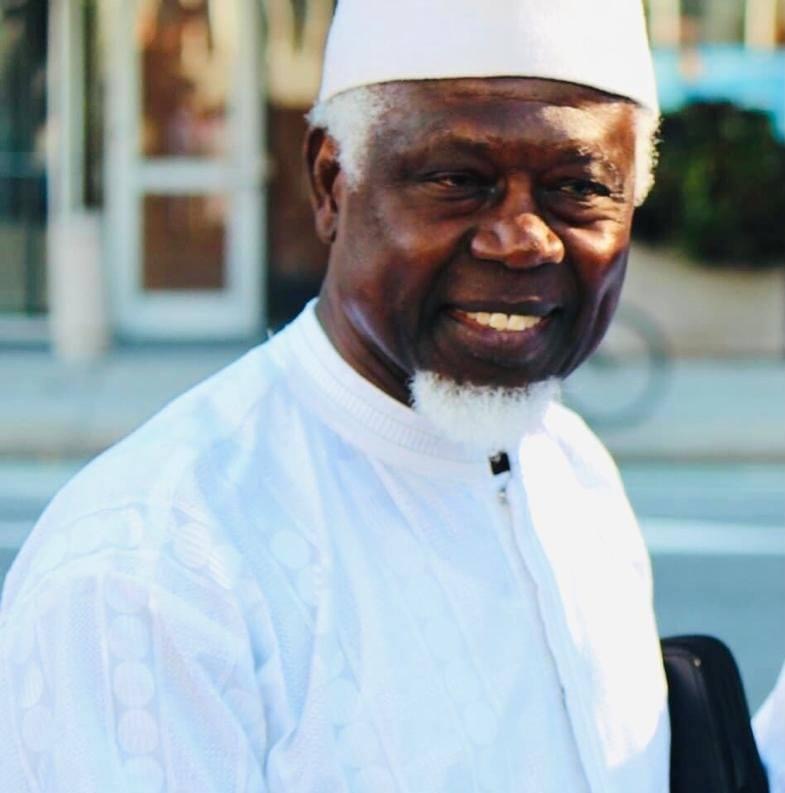By Alagi Yorro Jallow.
Death of a Scholar is the end of an era. When an older adult with an abundance of knowledge and wisdom dies, a library burns to the ground. The reality of death is harsh yet inevitable and inescapable. Alhagie Mustapha Senghor, Chairman of the Harlem Islamic Cultural Center, who had greatly influenced countless lives across the globe, has left for the final abode, leaving us behind in dismay.  However, we have nothing to say except the eye cries, the heart feels sorry. We will not utter any words other than what our Lord will consent.
However, we have nothing to say except the eye cries, the heart feels sorry. We will not utter any words other than what our Lord will consent.
Alhagie Mustapha Senghor succumbed to mortality, and we dare say immortality, on the 31 of January 2021. His passing was sudden and unexpected. He was 72. He is Late Alhagie Abdou Karim Senghor’s son, the first Gambian Post Master General and Secretary to the Muslim Religious Council in Banjul.
In recent times, I have not seen death dim so bright a light for the African- American and Gambian Islamic community in New York, our generation, and our nation than it did through resting the soul of this great gentleman.
If you ever interacted with Alhagie Mustapha Senghor for the one month of his absence, you must have understood the meaning of irreplaceability.
To mourn him is not to love him less but a sign of eternal remembrance.
Though so early his departure, so great a legacy he left. As a true friend and a mentor, I accept Alhagie Mustapha Senghor. He fit William Shakespeare’s words, “When he shall die, Take him and cut him out into little stars and he shall make the face of heaven so fine That all the world will be in love with night And pay no worship to the garish sun.”
My heartfelt and profound condolences to the bereaved family and the entire Harlem Islamic Cultural Center in New York. I had enormous respect for Mustapha Senghor and enjoyed his affection and matchless charm of giving delight and arousing admiration captivated. His passing is a loss to his family but for the nation and for all of us who had the privilege of crossing his path. His contributions to defining and defending the African -American socio-religious harmony index were substantial. His decency and courtliness were legendary.
I met Alhagie Mustapha Senghor in 1999. Twenty -two years ago. He was the Chairman of Harlem Islamic Center leader and a leader in the New York African Community and a “Muhadam” in the Tijaniyya Brotherhood. One of the attributes, nay values, that I discovered very early that Alhagie Mustapha Senghor had was that he was a very patient person. Despite his intellectual and revolutionary force of character, solid principles in Islam, etiquette, and insistence on justice, he was a patient person. I saw that on early display. He betrayed no anger. No frustration. He expressed no disappointment. He would express gratitude to every person he crossed path with that did not yield the expected fruits due to his workloads and busy schedules.
Alhagie Mustapha Senghor was also a very humble and respectful person. For him, stubborn fidelity to principles and humanitarian values should not rob one of his humility. Despite the apparent elder edge he had over me, he never addressed me without a “Sir Yorro.” Furthermore, he would never close a conversation without his characteristic “Mashallah. ” He thanked people so generously.
Alhagie Mustapha wore humility like an inseparable garb. Kindness and generosity of spirit complemented his humility. He was a very caring person. From so little, he gave out so much.
Alhagie Mustapha Senghor became my friend and brother during that period of my exile and struggle and after. When my mother took ill, he would procure and help in over the counter medication in bottles for her—regularly calling to ask how she was faring. Furthermore, he became a permanent face in all my family events.
In the theatre of popular religious and social events in America, Alhagie
Mustapha Senghor was very fond of everybody, his family, his wife, and his children. He introduced his family to me. Here goes a decent human being. My mentor, friend, brother, uncommon working-class warrior, leader, patriot, a devoted Muslim, and a leader of the Tijaniyya brotherhood in New York, and a public intellectual revolutionary like no other. A loving husband, a caring father, and a good family man.
His service and work in the Islamic community in America will be sorely missed. A General of the People’s Army has fallen when the battle is not yet over and when victory over our people’s enemies is yet to be accomplished.
Alhagie Mustapha Senghor, I wish I had the poetic composure to erect a tombstone of elegy in your honor to mark your painful passage. Words failed me. I could not go beyond the first building stone, the first stanza:
“When a day loses its sun rays
And a rainbow suddenly fades away.
When from the sky a lodestar is erased
Memories become our only solace.”
May the beautiful soul of Koto Alhagie Mustapha Senghor find a well-deserved rest, and may the Good Lord comfort his grieving family.
May Allah grant you Aljannah Firdausi.
 However, we have nothing to say except the eye cries, the heart feels sorry. We will not utter any words other than what our Lord will consent.
However, we have nothing to say except the eye cries, the heart feels sorry. We will not utter any words other than what our Lord will consent.
 However, we have nothing to say except the eye cries, the heart feels sorry. We will not utter any words other than what our Lord will consent.
However, we have nothing to say except the eye cries, the heart feels sorry. We will not utter any words other than what our Lord will consent.


Ma sha Allah great and thanks for sharing